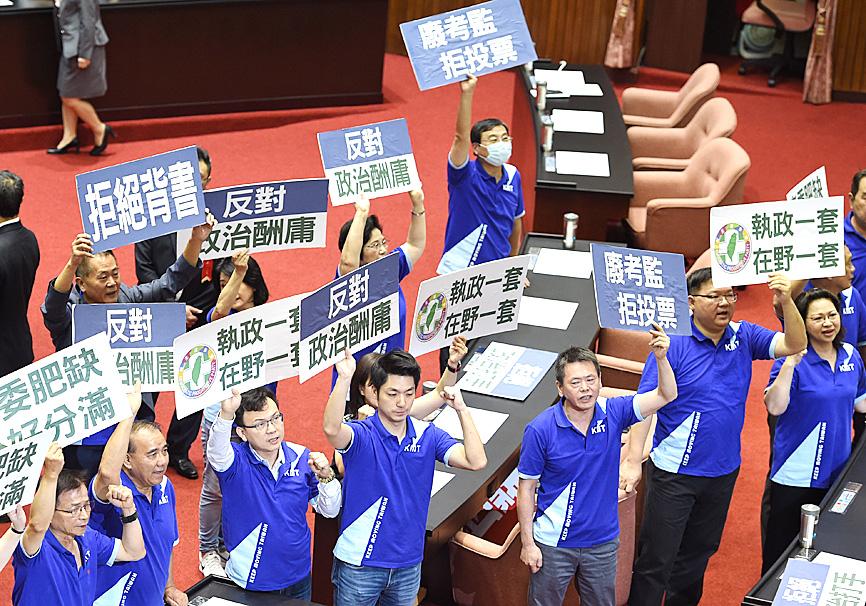The Legislative Yuan yesterday approved Examination Yuan and National Communications Commission (NCC) nominees after Democratic Progressive Party (DPP) lawmakers voted in favor of the nominations.
Examination Yuan presidential nominee Huang Jong-tsun (黃榮村), a former minister of education and China Medical University president, and vice presidential nominee Chou Hung-hsien (周弘憲), a former minister of civil service, each received 65 “yes” and three “no” votes.
The Legislative Yuan also approved nine Examination Yuan members: Council of Indigenous Peoples Deputy Minister Iwan Nawi; former Overseas Community Affairs Council minister Wu Hsin-hsing (吳新興); former deputy minister of education Yao Leeh-ter (姚立德); former department of health deputy director Wang Hsiu-hung (王秀紅); current Examination Yuan members Chen Tsi-yang (陳慈陽) and Yang Ya-hwei (楊雅惠); National Chengchi University Department of Public Finance chairwoman Ho Yi-cheng (何怡澄); Chang Jung Christian University professor emeritus Chen Chin-seng (陳錦生); and National Taiwan University professor Chou Lien-siang (周蓮香).

Photo: Liu Hsin-de, Taipei Times
Chen Chin-seng and Chou Lien-siang received 63 “yes,” three “no” and one spoiled votes, while the other nominees were approved with 64 “yes” and three “no” votes.
During a question-and-answer session at the Legislative Yuan on Wednesday, Huang said that as head of the Examination Yuan, he would comply with any legislative efforts to abolish the Examination Yuan and the Control Yuan — a cause that has been advocated by many people.
If the legislature amends the Constitution to phase out these branches, Huang said he would ensure that the Examination Yuan transfers to other agencies its responsibilities for designing civil service entrance tests and evaluating the performances of civil servants.
Prior to the vote, three New Power Party (NPP) lawmakers said they would vote against the nominations, based on their refusal to turn in an eight-question survey from the lawmakers, which they said showed the nominees’ “arrogance.”
Acting NCC Chairman Chen Yaw-hsyang (陳耀祥) and former NCC deputy chairman Wong Po-tsung (翁柏宗) yesterday became NCC chairman and deputy chairman respectively after receiving a majority the DPP caucus’ votes.
First-time nominees National Taiwan University Graduate Institute of Journalism professor Lin Lih-yun (林麗雲) and National Taiwan Normal University Graduate Institute of Mass Communication chairwoman Wang Wei-ching (王維菁), as well as NCC spokesman Hsiao Chi-hung (蕭祈宏), were also approved.
The NPP caucus said prior to the vote that they would only approve the first-time nominees, as the incumbents and holdovers from the agency had not adequately cracked down on Chinese-sponsored media from churning out “fake news.”
Chinese Nationalist Party (KMT) lawmakers withdrew from the vote and scrawled protests on the ballots, accusing the DPP of using the independent agency as a tool for persecuting political rivals.
Additional reporting by Chen Yun and Wu Su-wei

DEFENSE: The National Security Bureau promised to expand communication and intelligence cooperation with global partners and enhance its strategic analytical skills China has not only increased military exercises and “gray zone” tactics against Taiwan this year, but also continues to recruit military personnel for espionage, the National Security Bureau (NSB) said yesterday in a report to the Legislative Yuan. The bureau submitted the report ahead of NSB Director-General Tsai Ming-yen’s (蔡明彥) appearance before the Foreign and National Defense Committee today. Last year, the Chinese People’s Liberation Army (PLA) conducted “Joint Sword-2024A and B” military exercises targeting Taiwan and carried out 40 combat readiness patrols, the bureau said. In addition, Chinese military aircraft entered Taiwan’s airspace 3,070 times last year, up about

A magnitude 4.3 earthquake struck eastern Taiwan's Hualien County at 8:31am today, according to the Central Weather Administration (CWA). The epicenter of the temblor was located in Hualien County, about 70.3 kilometers south southwest of Hualien County Hall, at a depth of 23.2km, according to the administration. There were no immediate reports of damage resulting from the quake. The earthquake's intensity, which gauges the actual effect of a temblor, was highest in Taitung County, where it measured 3 on Taiwan's 7-tier intensity scale. The quake also measured an intensity of 2 in Hualien and Nantou counties, the CWA said.

The Overseas Community Affairs Council (OCAC) yesterday announced a fundraising campaign to support survivors of the magnitude 7.7 earthquake that struck Myanmar on March 28, with two prayer events scheduled in Taipei and Taichung later this week. “While initial rescue operations have concluded [in Myanmar], many survivors are now facing increasingly difficult living conditions,” OCAC Minister Hsu Chia-ching (徐佳青) told a news conference in Taipei. The fundraising campaign, which runs through May 31, is focused on supporting the reconstruction of damaged overseas compatriot schools, assisting students from Myanmar in Taiwan, and providing essential items, such as drinking water, food and medical supplies,

New Party Deputy Secretary-General You Chih-pin (游智彬) this morning went to the National Immigration Agency (NIA) to “turn himself in” after being notified that he had failed to provide proof of having renounced his Chinese household registration. He was one of more than 10,000 naturalized Taiwanese citizens from China who were informed by the NIA that their Taiwanese citizenship might be revoked if they fail to provide the proof in three months, people familiar with the matter said. You said he has proof that he had renounced his Chinese household registration and demanded the NIA provide proof that he still had Chinese